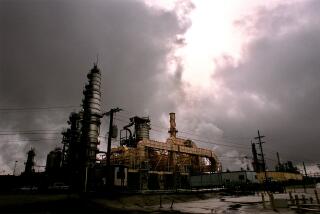OPEC ‘Disarray’ Pushes Crude Prices Below $17 : W. Texas Intermediate Slips to $16.63, Its Lowest Since March
- Share via
NEW YORK — Crude oil dropped below $17 a barrel for the first time since March as skepticism mounted Tuesday that OPEC’s agreement to limit production would do little to curb the world’s oil glut.
Analysts said they expected prices to remain weak for some time, given bountiful existing supplies, seasonal factors and production incentives stimulated by the weakening dollar.
“What we’ve got is disarray out of OPEC,” said Al Ballard, a broker with Broder Oil Futures in Houston. “The market looks like it wants to test the $15 (per barrel) range. The market was under great strain from their overproduction to begin with.”
Other analysts predicted that prices would hover between $16 and $17 a barrel for months, barring an extraordinary disruption.
At the New York Mercantile Exchange, contracts for January delivery of West Texas Intermediate, the benchmark U.S. crude, closed at $16.63 per 42-gallon barrel. That was down 81 cents from Monday’s close, when the contract lost 87 cents a barrel.
Record Trading Volume
The contract had not sold below $17 a barrel since March 2, when it closed at $16.39 a barrel.
Trading was heavy, with a record 152,846 contracts changing hands, said Mary Ann Matlock, a spokeswoman for the exchange. She said the previous record volume was 127,386 crude contracts on Dec. 9.
Refined products also continued to slide.
Wholesale heating oil fell to 51 cents a gallon, down 2.36 cents for the session and 3.93 cents over two days.
Wholesale unleaded gasoline, which dropped 1.45 cents a gallon Monday, fell 1.98 cents more, closing at 43.07 cents a gallon.
Although oil prices on the spot market climbed 5 to 10 cents a barrel late Tuesday following the weekly oil stock report from the American Petroleum Institute, the move did little to erase the losses.
The API reported that crude oil stocks rose 1.9 million barrels for the week to 360.7 million barrels, a slightly smaller increase than had been expected.
‘OPEC Dropped the Ball’
“The market is experiencing a free-fall without a parachute,” said Nauman Barakat, oil analyst at Smith Barney Harris Upham & Co. “OPEC dropped the ball, agreeing to a pact that was politically motivated and relegating economic issues to the back burner.”
After six days of fruitless bargaining over pricing and output, members of the Organization of Petroleum Exporting Countries threw in the towel Monday and agreed to a six-month extension of its current prices and production quotas.
The 13-member cartel voted 12 to 1 in favor of the pact, which provides for a overall limit of 15.06 million barrels a day for all members except Iraq.
Iraq, which failed to win a quota equal to Iran, its foe in a seven-year war, was the lone dissident, promising to respect no limit to its production.
Iraq’s output has been running at about 2.7 million barrels daily, higher than the unofficial 1.54-million-barrel daily allotment offered by the cartel.
Iran failed in a bid to raise the cartel’s target price to $20.70 from $18, even though all oil producers have lost purchasing power with the declining dollar.
OPEC officials bravely predicted that the cartel’s action would bolster the official $18 price. But with world supplies already more than plentiful, the prospect of an undisciplined cartel spilling more unwanted oil onto the market sent prices into a quick tailspin around the world.
In London, for instance, the price of Britain’s North Sea Brent crude for January delivery fell 83 cents a barrel to $17.15 on Monday and 55 cents more to $16.60 on Tuesday.
John H. O’Connell, an analyst at the Refco Inc. commodities firm, said the market was disappointed with OPEC’s performance.
Discounting to Continue
“They had expected some sort of inclusion of Iraq. They had anticipated some sort of output reduction--from 18.5 million barrels a day to, say, 17.5 million barrels. And they got nothing,” he said.
The analyst said he expects prices will remain “in the lower end of the $16 to $17 range” for at least the next six months.
Dillard Spriggs, president of Petroleum Analysis Ltd., a consulting firm, also said he expected prices to remain in the $16 to $17 range “for a while.”
More to Read
Inside the business of entertainment
The Wide Shot brings you news, analysis and insights on everything from streaming wars to production — and what it all means for the future.
You may occasionally receive promotional content from the Los Angeles Times.







